Skin Care for the Elderly — A Guide to Caring for Aging Skin
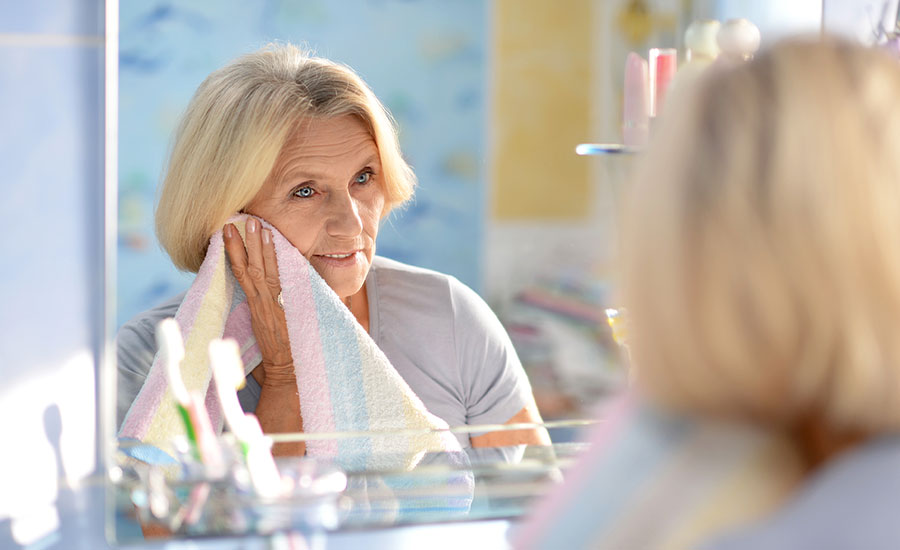
While aging is a natural part of life, it’s not always easy. Factors like mobility, memory and even skin can show signs of aging and change over time.
If you’re caring for a senior loved one, knowing how to properly care for their skin is part of keeping your loved one healthy, comfortable and safe from potentially harmful conditions.
We’ll share the 10 most common skin conditions to look out for and our top recommendations on skin care for the elderly.
Plus, we’ll explain how our dedicated team at Always Best Care Senior Services can help provide personal care around-the-clock for your loved one, whether in the comfort of your home or in an assisted living facility.
Table of Contents
A Look at Skin Care for the Elderly: What Happens to Skin as You Age?
Over time, skin becomes thinner and loses its elasticity, which can lead to sagging and wrinkles. The skin’s ability to retain moisture also decreases with age, resulting in dryness and itching.
Aging skin can become:
- Rough, dry and itchy
- Prone to sagging
- Prone to irritation and skin infections
- Slower to heal
Factors that can speed up the skin’s aging process include:
- Ethnicity — Caucasians develop wrinkles earlier, compared to other ethnicities
- Heredity
- Sun exposure
- Obesity
- Lifestyle choices, such as smoking
10 Common Skin Conditions in the Elderly
As your loved one ages, their skin undergoes changes, making them more susceptible to a wide range of skin conditions.
Some of the most common skin issues in the elderly include:
1. Senile Purpura
Senile purpura is a harmless skin condition, characterized by the appearance of purple or dark red spots (purpura) or patches on the skin.
They are mostly seen on the forearms of the elderly.
In those who develop this condition, the blood vessels beneath the skin’s surface become weaker, making them more prone to breakage. When these fragile blood vessels break, blood leaks into the surrounding skin, causing the purpura.
2. Xerosis
Xerosis, also known as dry skin, is characterized by the appearance of skin that is rough, scaly, itchy or flaky.
Xerosis is common in the elderly, as it occurs when the skin cannot retain enough moisture.
3. Senile Freckles
Senile freckles, also known as liver spots, are harmless flat, brown, gray or black spots.
They are a result of melanin accumulation — the pigment that gives color to the skin, hair, and eyes.
They are mostly seen on areas of the skin that have been exposed to the sun over the years, such as the face, hands, shoulders, and arms.
We’ve touched on the importance of Vitamin D for seniors, but there are plenty of other ways to get this crucial vitamin that don’t involve sun damage.
4. Ringworm Infections
Ringworm is a common skin infection characterized by a ring-shaped rash and flaky or cracked skin around the rash.
Despite its name, ringworm infections are caused by a fungus.
In the elderly, the risk of developing ringworm might be slightly higher due to a weakened immune system.
5. Shingles
Shingles is a viral infection characterized by a single stripe of blisters, usually appearing on one side of the body or face.
This condition is caused by the varicella-zoster virus — the same virus that causes chickenpox. While shingles isn’t harmful, it can cause discomfort.
6. Skin Tags
Skin tags are soft, flesh-colored growths that hang off the skin. They are benign (non-cancerous) and usually harmless.
Skin tags can develop in different locations on the body, but they often appear in areas where the skin frequently rubs against clothing or other skin, such as the armpits, neck, groin, or underneath the breasts.
7. Skin Cancer
Skin cancer is the abnormal growth of skin cells, caused by the sun’s harmful ultraviolet (UV) rays or other sources of UV radiation, like tanning beds.
Due to sun exposure over the years, skin cancer is more common in the elderly.
8. Stasis Dermatitis
Stasis dermatitis is a skin condition that affects the lower legs and appears in the ankles — usually in people with poor blood circulation. It is characterized by thick, discolored (reddish) skin.
Stasis dermatitis occurs when blood doesn’t flow properly through the veins in the legs, leading to increased pressure in the veins and fluid buildup in the surrounding tissues.
9. Bedsores
Bedsores, also known as pressure sores, are injuries to the skin and underlying tissues. They are characterized by the appearance of red craters, which may progress into a purplish hue in late stages.
Bed sores are more common in elderly patients who are bedridden or have limited mobility, as they are unable to regularly change positions to relieve pressure.
They typically develop on areas of the body where the bones are close to the skin, including the hips, tailbone, heels, elbows, and shoulder blades.
10. Skin Tear
A skin tear is a type of wound that occurs when the skin gets damaged — usually as a result of friction or minor trauma.
Skin tears usually appear on the arms, hands or legs. They are more common in the elderly because the skin becomes thinner, less elastic, and more fragile with age.
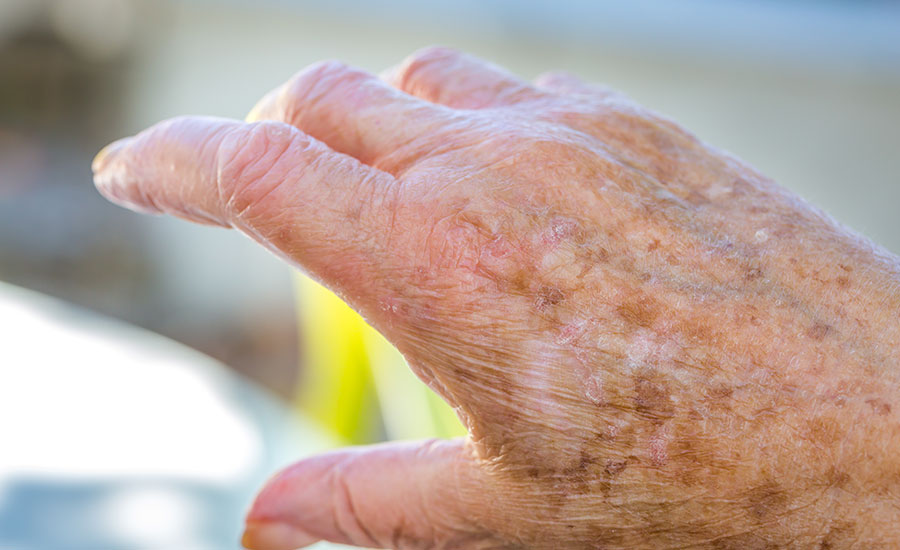
The Importance of Skin Care for the Elderly
From preventing infections to ensuring your loved one maintains a positive self-image, implementing proper skin care in the elderly is important for several reasons.
1. Maintain Healthy Skin
Aging skin loses its ability to retain moisture and produce collagen, which can lead to dryness, itching, and increased risk of injury.
With proper skin care, you can help your loved one maintain their skin’s moisture levels and support the body’s natural barrier function.
2. Prevent Infections
As your loved one’s skin becomes thinner and weaker with age, it is more susceptible to bacterial and fungal infections.
Good hygiene and skin care practices can help reduce the risk of infections, so your loved one can stay healthy.
3. Improve Wound Healing
Your loved one might experience slower wound healing because of reduced blood flow and a weakened immune system, which can occur with age.
With proper skin care, you can help your loved one reduce the risk of complications such as infections or chronic wounds.
4. Reduce the Risk of Skin Cancer
Due to a lifetime of sun exposure, your loved one might have a higher risk of skin cancer. In fact, 1 out of 5 Americans will develop some form of cancer by the age of 70.
Regular skin care, including sun protection and mole examinations, can help with the early detection and prevention of skin cancer.
5. Improve Comfort and Quality of Life
Aging skin can become dry, itchy, and uncomfortable. Proper skin care improves your loved one’s comfort and quality of life by keeping their skin hydrated, healthy, and less susceptible to injuries or infections.
In addition, maintaining good skin health contributes to the overall well-being, self-image, and emotional well-being of your loved one.
Tips to Improve Skin Care in the Elderly
While aging skin can come with feelings of discomfort and anxiety, it is important to motivate your loved one to embrace it with open arms and love themselves despite aging.
Encourage your loved one to:
- Use mild, fragrance-free cleansers to prevent irritation
- Use a broad-spectrum sunscreen with an SPF of at least 30 to protect the skin from harmful UV rays
- Apply moisturizer daily. Use products that contain ingredients such as hyaluronic acid, glycerin, and ceramides to help lock in moisture.
- Wash with lukewarm water instead of hot water, as hot water can strip natural oils from the skin
- Wear long-sleeved, lightweight clothes to protect skin from the sun
- Use soft towels to pat skin dry
- Avoid sun exposure between 10am and 4pm, when the sun’s UV rays are the strongest
- Drink around six to eight glasses of water a day. (Read our guide on the importance of staying hydrated for seniors for more info!)
- Get enough sleep — around seven to nine hours each night. The skin creates new collagen during sleep, which can help prevent wrinkles and sagging.
- Eat a balanced diet rich in antioxidants, vitamins and minerals. Include vegetables, fruits, healthy fats, and lean protein in daily meals.
- Quit smoking, and limit alcohol and caffeine consumption to prevent dehydration
- Use a humidifier to add moisture to the air — this can be especially useful during dry winter months
- Perform a skin check once a month to look for new moles and changes in existing moles. If you see any changes, make an appointment with a healthcare provider.
- Visit a dermatologist at least once a year to address skin issues and assess overall skin health
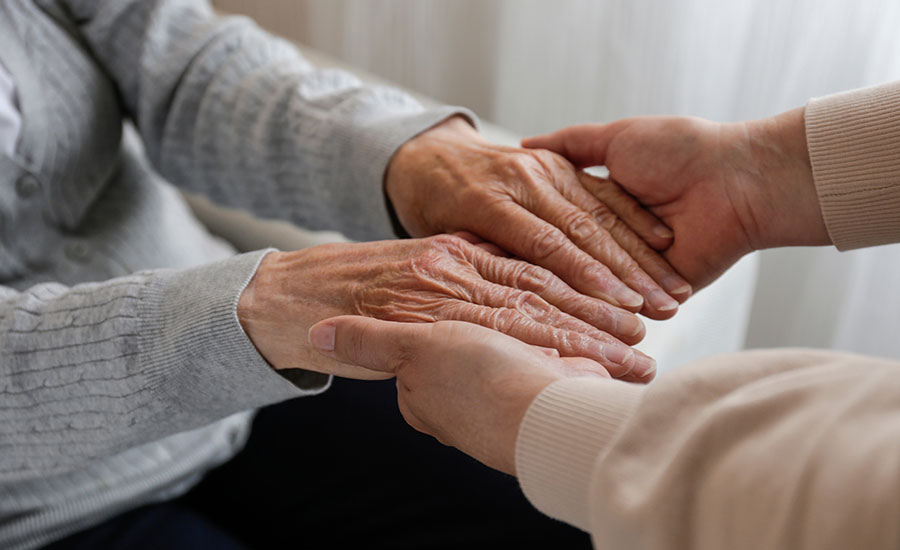
Personal Care for the Elderly at Always Best Care Senior Services
At Always Best Care Senior Services, we provide top-quality health care services for the elderly, including skin care, nutrition monitoring, pain management and more.
For over 25 years, our dedicated team has been delivering reliable and compassionate senior care across the United States and Canada, serving our valued clients through an extensive network of more than 225 locations.
Our services include:
- In-home senior care services: We provide around-the-clock live-in care, including nutrition monitoring and medication reminders, cancer care and recovery, nutrition education and support, pain management, skin irritations and more
- Special care services: We offer personalized care plans tailored to your loved one’s needs, along with remote patient monitoring
- Respite care services: We offer support through respite care services, whether it’s looking after your loved one for an extended period or just a few hours per week, so you can get the break you need from caregiving
Our services are conveniently offered in the comfort of your loved one’s home, whether it’s an apartment, a relative’s residence, or a senior living community.
At Always Best Care Senior Services, our compassionate staff provides the highest level of care and support for each and every patient in our care. Contact our team to schedule a consultation and find out how we can make a significant difference in your loved one’s comfort and quality of life.


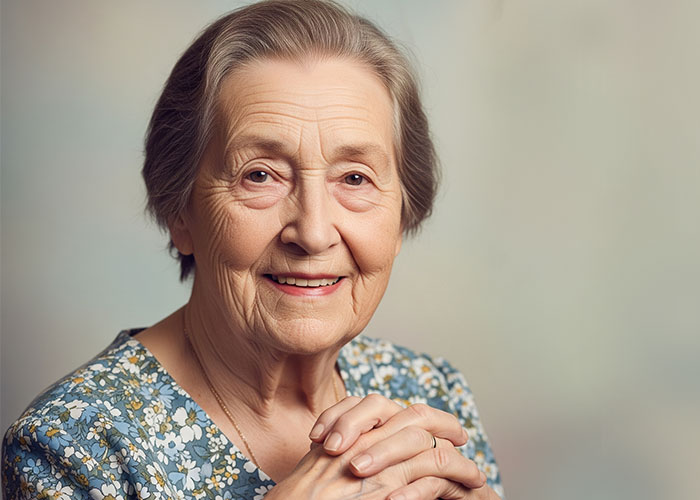
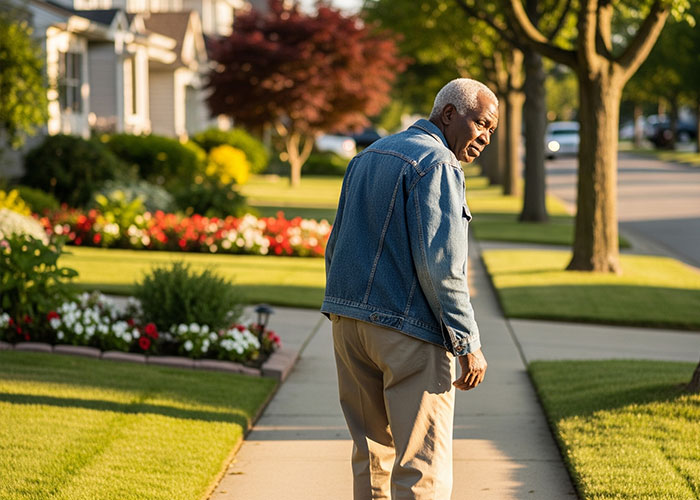
![10 Senior Living Technologies You Should Know About [+ FAQs]](https://alwaysbestcare.com/wp-content/uploads/2025/06/senior-living-technology-hero-image.jpg)
